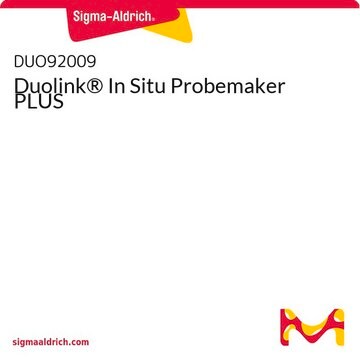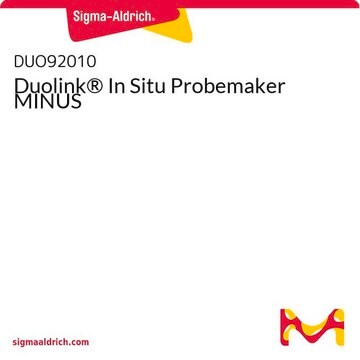DUO92014
Duolink® In Situ Detection Reagents Green
Synonym(s):
in situ Proximity Ligation Assay reagent, Protein Protein Interaction Assay reagent
About This Item
Recommended Products
product line
Duolink®
technique(s)
proximity ligation assay: suitable
fluorescence
λex 495 nm; λem 527 nm (green) (FITC (Cyanine 2), Zeiss Filter set 38)
suitability
suitable for fluorescence
shipped in
dry ice
storage temp.
−20°C
General description
Specificity
Application
- vasopressin and gonadotropin-releasing hormone (GnRH) from frozen rat brain sections
- human embryonic kidney 293 cells (HEK)
- pituitary tissues
Features and Benefits
- No overexpression or genetic manipulation reNo overexpression or genetic manipulation required
- High specificity (fewer false positives)
- Single molecule sensitivity due to rolling circle amplification
- Relative quantification possible
- No special equipment needed
- Quicker and simpler than FRET
- Increased accuracy compared to co-IP
- Publication-ready results
Components
- 5x Ligation - Contains oligonucleotides that hybridize to the PLA probes and all components needed for ligation except the Ligase
- 1x Ligase (1 unit/μL)
- 1x Polymerase (10 units/μL)
- 5x Amplification Green - Contains all components needed for Rolling Circle Amplification (RCA) except the Polymerase. It also contains oligonucleotide probes labeled with a fluorophore that hybridize to the RCA product.
Not included in Detection kit:
Primary antibodies, PLA probes, wash buffers, mounting medium
Preparation Note
Storage and Stability
Other Notes
Visit our Duolink® PLA Resource Center for information on how to run a Duolink® experiment, applications, troubleshooting, and more.
Let us do the work for you, learn more about our Custom Service Program to accelerate your Duolink® projects
View full Duolink® product list
Legal Information
Signal Word
Danger
Hazard Statements
Precautionary Statements
Hazard Classifications
Resp. Sens. 1
Storage Class Code
10 - Combustible liquids
Certificates of Analysis (COA)
Search for Certificates of Analysis (COA) by entering the products Lot/Batch Number. Lot and Batch Numbers can be found on a product’s label following the words ‘Lot’ or ‘Batch’.
Already Own This Product?
Find documentation for the products that you have recently purchased in the Document Library.
Customers Also Viewed
Articles
Things to consider for preparation, setup and execution of the Duolink® assay protocol
Support information including tips and tricks, frequently asked questions, and basic troubleshooting.
Protocols
This protocol describes how to perform immunofluorescent detection of proteins in cells and tissue.
This page details the Duolink® In Situ Short Protocol for fluorescence detection
Related Content
Applications to detect, quantify and visualize protein-protein interactions, post-translational modifications and low expression protein detection using proximity ligation assay
Our team of scientists has experience in all areas of research including Life Science, Material Science, Chemical Synthesis, Chromatography, Analytical and many others.
Contact Technical Service











